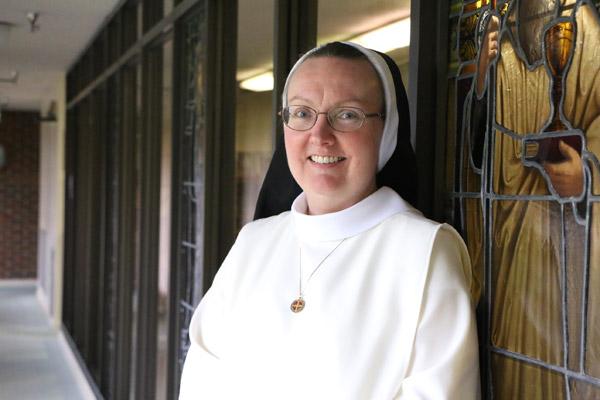
In one day, Sister Johanna Marie Melnyk, OSB, became a “mother” to around 35 religious sisters at Holy Angels Convent in Jonesboro. Mother Johanna Marie was elected prioress June 24, tasked with leading the community.
“What I learned from Sister Lillian (Marie Reiter, the previous prioress), she really wanted us to be a true family. We’re called sisters and she really wanted us to be sisters to each other,” Mother Johanna Marie said. “I made a little announcement to the sisters that as prioress I wish to be addressed as ‘Mother’ because I was really going to try to be that to the community — to be a mother to the community.”
Mother Johanna Marie, 44, came to Holy Angels in 2014, transferring from the Olivetan Benedictine community of Our Lady of Peace in England.
There’s a three-year probationary period for the official transfer of vows between communities. Mother Johanna Marie’s formal transfer was completed June 12 and she was elected prioress 12 days later. Sister Lillian served the maximum of two three-year terms as prioress.
While she admits it was “slightly overwhelming” and having a “sinking feeling when you see the votes tallying up,” Mother Johanna Marie trusts the election process. The sisters prayed each day for a month before the election for the Holy Spirit’s guidance. Bishop Anthony B. Taylor celebrated Mass for the community before the election.
“I can only conclude when I was elected I must be the one God wants right now … my answer could only be yes,” she said.
But Mother Johanna Marie admits her path to this moment was “long, twisting and turning.”
She grew up in Northwood, Ohio, a suburb of Toledo, as an only child. She was baptized into the Eastern Rite Church, as her father was Ukrainian, but she was raised Lutheran in her mother’s church.
“I was always a religious kid growing up, loved Vacation Bible School, Sunday school,” she said, but in her teens, she was attracted to the Catholic faith and ‘reverted’ to Roman Catholicism at 17. “It was really the fullness of the Catholic faith.”
During the summer leading into her freshman year of college at DePaul University in Chicago, she spent three months with the Discalced Carmelites in Sioux City, Iowa, where she learned “how much more I needed to mature personally and in my spiritual life.”
Mother Johanna Marie graduated with a bachelor’s degree in English in 1995 and a master’s degree in English literature in 1996 from the University of Birmingham in England. She returned to Chicago as a book editor for three years before heading back to England to earn her doctorate in English literature in 2002.
In 2003 she joined Our Lady of Peace Priory in Bedford, England, feeling “at home with the Benedictine tradition.”
During the 2016-2017 school year she taught a Great Books course to seminarians at the House of Formation in Little Rock through St. Gregory University at Shawnee, Okla., as well as writing and study skills. She was a catechetical assistant at Christ the King Church in Little Rock.
“I really learned about the power of the habit and the power of your presence” as a religious sister, she said.
Since her election as prioress, she said she’s had “ideas swimming in my head 24/7.”
“I do have things I want to see. I think to me when you elect someone who is 44, not the traditional age really for a superior … that says you want kind of a fresh perspective on things. The community is ready to change and grow and try different things.”
While the fundamentals of the community — prayer and work — do not change, “the way we do our ministries, how we reach out to the community, those things can change. That’s where I’m trying to look at, what do we need to do now?”
Please read our Comments Policy before posting.
Article comments powered by Disqus Winning directory photo honors Our Lady of Guadalupe
Winning directory photo honors Our Lady of Guadalupe
 Sister Dominica Wise, OSB, died July 22 at 92
Sister Dominica Wise, OSB, died July 22 at 92
 Religious orders celebrate jubilarians on anniversaries
Religious orders celebrate jubilarians on anniversaries
 Jonesboro sister takes top place in annual photo contest
Jonesboro sister takes top place in annual photo contest
 Sister Mary Clare, OSB, elected prioress of Holy Angels
Sister Mary Clare, OSB, elected prioress of Holy Angels
 Studio 3:16 offers new approach to teaching religion
Studio 3:16 offers new approach to teaching religion
 After three decades, NLR principal plans to retire
After three decades, NLR principal plans to retire
 CHS athlete overcomes odds to reach collegiate goal
CHS athlete overcomes odds to reach collegiate goal
 John Calipari: UA basketball coach and devout Catholic
John Calipari: UA basketball coach and devout Catholic
 'Cabrini' film tells story of saint with great faith
'Cabrini' film tells story of saint with great faith
 St. Joseph a model of solidarity with immigrants
St. Joseph a model of solidarity with immigrants
 Two gifts after Jesus’ death: Virgin Mary and Eucharist
Two gifts after Jesus’ death: Virgin Mary and Eucharist
 Why we have an altar, and not just a communion table
Why we have an altar, and not just a communion table
 Pope: Wars should be resolved through nonviolence
Pope: Wars should be resolved through nonviolence
 Living relationship with Jesus Christ in the Eucharist
Living relationship with Jesus Christ in the Eucharist